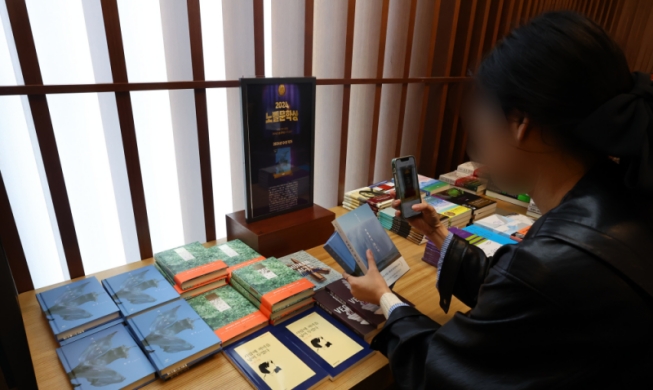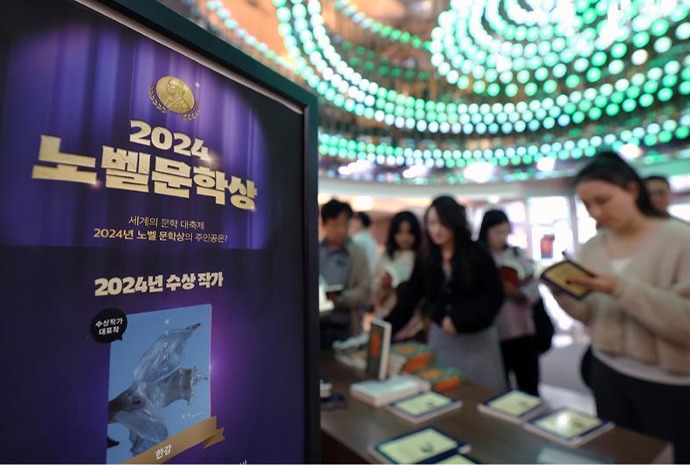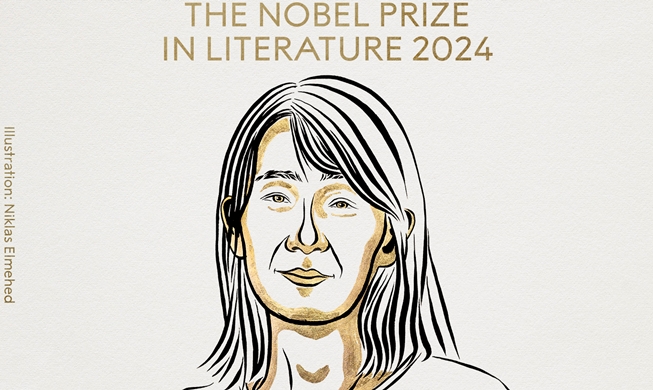- 한국어
- English
- 日本語
- 中文
- العربية
- Español
- Français
- Deutsch
- Pусский
- Tiếng Việt
- Indonesian

The Swedish daily Svenska Dagbladet on Oct. 10 reports on novelist Han Kang's historic winning of the Nobel Prize for Literature. (Screen capture from daily's website)
By Yoon Sojung
Leading global media on Oct. 10 covered the Swedish Academy’s announcement of novelist Han Kang as the winner of this year's Nobel Prize in Literature, highlighting her influence on both the literary world and Korean culture.
The Swedish daily Svenska Dagbladet in its article "Han Kang: Blacklisted yesterday - Nobel Prize today" quoted the academy as saying she won for "her intense poetic prose that confronts historical traumas and exposes the fragility of human life."
The story also called Han a popular writer with a huge fan base worldwide compared to previous winners of the award in recent years.
In its article "After K-pop, K-novels? South Korean Nobel win sparks joy, hope at home," AFP of France covered the responses of Korean news media to her win and the country’s celebratory mood over Han's historic win, mentioning the global boom in Hallyu (Korean Wave) led by K-pop and K-dramas.
In another story posted the same day headlined "S. Korea's Nobel Winner Han Kang: A Modest, Thought-provoking Writer," AFP focused on the author.
"Han's works are known for their profound and thought-provoking narratives, often exploring themes of violence and trauma," it said. "She is only the second South Korean to receive a Nobel prize, after former president Kim Dae-jung received the Peace Prize in 2000 for his efforts to end tensions with North Korea."

Foreign media on Oct. 10 widely reported Han Kang winning the Nobel Prize in Literature, highlighting the global influence of Korean culture. Shown is a screen shot of the AFP article titled "After K-pop, K-novels? South Korean Nobel win sparks joy, hope at home." (Screen capture from AFP's website)
In the article "South Koreans are joyful after Han Kang wins Nobel Prize for literature," the U.S.-based Associated Press said, "Han’s triumph adds to the growing global influence of South Korean culture, which in recent years included the successes of director Bong Joon-ho’s Oscar-winning 'Parasite,' the brutal Netflix survival drama 'Squid Game' and K-pop groups like BTS and BLACKPINK."
Calling her award a surprise, the New York Times said in its article "Han Kang Is Awarded Nobel Prize in Literature," "In recent years, the academy has tried to increase the diversity of authors considered for the literature prize, after facing criticism over the low number of laureates who were female or came from outside Europe and North America."
The Japanese financial daily Nihon Keizai Shimbun in its article said, "President Yoon 'sublimates the wounds of modern Korean history' on Han’s winning Nobel Prize in Literature." It added that her father is also a leading novelist of Korea with high popularity who has led the domestic literary circle.
Another Japanese daily, The Mainichi Shimbun, also highlighted Han in its article "S. Korea's Han Kang, first Asian woman to win Nobel for literature, shows Asia's growing influence" as the first Asian woman to win the award.
arete@korea.kr



